Ethical Implications in Dementia Research - CNA688 Clinical Practice
VerifiedAdded on 2023/06/03
|7
|1260
|460
Report
AI Summary
This report addresses the ethical considerations in a research scenario where patients with dementia appear to receive less pain relief after orthopedic surgery compared to patients without dementia. It identifies key values and principles from the Australian National Statement on Ethical Conduct that are relevant to the study, such as respect for persons, beneficence, justice, and research merit and integrity. The report also discusses ethical considerations for research participants with dementia, including their capacity to consent, potential vulnerabilities, and the need for appropriate safeguards. Mitigation strategies, such as involving caregivers in the consent process, using non-verbal pain assessment tools, and providing additional support and monitoring, are suggested to ensure ethical obligations are met. The importance of reducing vascular risk factors, promoting cognitive and physical activities, encouraging social engagement, maintaining a balanced diet, and addressing depression to prevent dementia are also highlighted. This assignment solution is available on Desklib, where students can access a wealth of academic resources, including past papers and solved assignments.
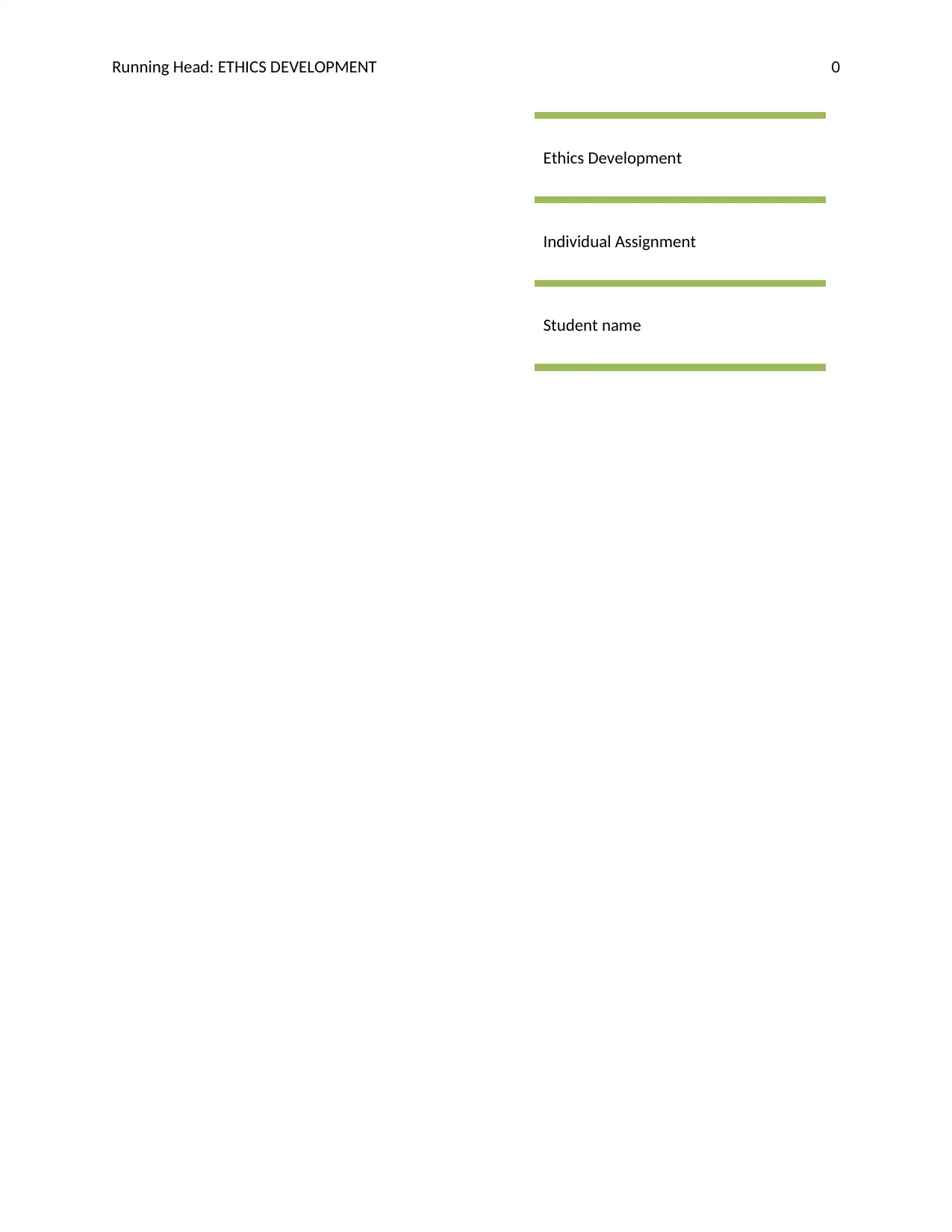
Running Head: ETHICS DEVELOPMENT 0
Ethics Development
Individual Assignment
Student name
Ethics Development
Individual Assignment
Student name
Paraphrase This Document
Need a fresh take? Get an instant paraphrase of this document with our AI Paraphraser

Ethics Development 1
Table of Contents
Answer – 1:..................................................................................................................................................1
Answer – 2:..................................................................................................................................................3
Works Cited.................................................................................................................................................5
Table of Contents
Answer – 1:..................................................................................................................................................1
Answer – 2:..................................................................................................................................................3
Works Cited.................................................................................................................................................5
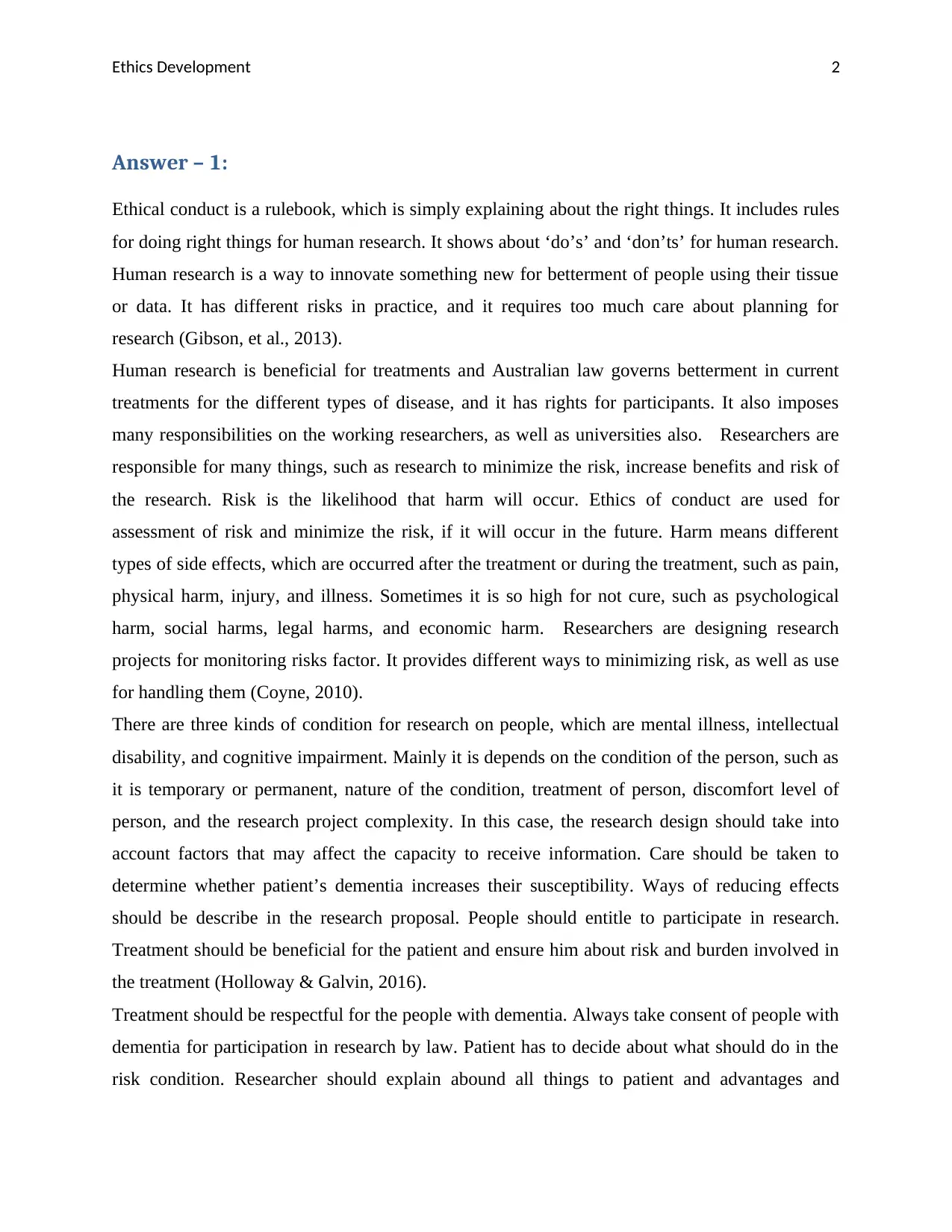
Ethics Development 2
Answer – 1:
Ethical conduct is a rulebook, which is simply explaining about the right things. It includes rules
for doing right things for human research. It shows about ‘do’s’ and ‘don’ts’ for human research.
Human research is a way to innovate something new for betterment of people using their tissue
or data. It has different risks in practice, and it requires too much care about planning for
research (Gibson, et al., 2013).
Human research is beneficial for treatments and Australian law governs betterment in current
treatments for the different types of disease, and it has rights for participants. It also imposes
many responsibilities on the working researchers, as well as universities also. Researchers are
responsible for many things, such as research to minimize the risk, increase benefits and risk of
the research. Risk is the likelihood that harm will occur. Ethics of conduct are used for
assessment of risk and minimize the risk, if it will occur in the future. Harm means different
types of side effects, which are occurred after the treatment or during the treatment, such as pain,
physical harm, injury, and illness. Sometimes it is so high for not cure, such as psychological
harm, social harms, legal harms, and economic harm. Researchers are designing research
projects for monitoring risks factor. It provides different ways to minimizing risk, as well as use
for handling them (Coyne, 2010).
There are three kinds of condition for research on people, which are mental illness, intellectual
disability, and cognitive impairment. Mainly it is depends on the condition of the person, such as
it is temporary or permanent, nature of the condition, treatment of person, discomfort level of
person, and the research project complexity. In this case, the research design should take into
account factors that may affect the capacity to receive information. Care should be taken to
determine whether patient’s dementia increases their susceptibility. Ways of reducing effects
should be describe in the research proposal. People should entitle to participate in research.
Treatment should be beneficial for the patient and ensure him about risk and burden involved in
the treatment (Holloway & Galvin, 2016).
Treatment should be respectful for the people with dementia. Always take consent of people with
dementia for participation in research by law. Patient has to decide about what should do in the
risk condition. Researcher should explain abound all things to patient and advantages and
Answer – 1:
Ethical conduct is a rulebook, which is simply explaining about the right things. It includes rules
for doing right things for human research. It shows about ‘do’s’ and ‘don’ts’ for human research.
Human research is a way to innovate something new for betterment of people using their tissue
or data. It has different risks in practice, and it requires too much care about planning for
research (Gibson, et al., 2013).
Human research is beneficial for treatments and Australian law governs betterment in current
treatments for the different types of disease, and it has rights for participants. It also imposes
many responsibilities on the working researchers, as well as universities also. Researchers are
responsible for many things, such as research to minimize the risk, increase benefits and risk of
the research. Risk is the likelihood that harm will occur. Ethics of conduct are used for
assessment of risk and minimize the risk, if it will occur in the future. Harm means different
types of side effects, which are occurred after the treatment or during the treatment, such as pain,
physical harm, injury, and illness. Sometimes it is so high for not cure, such as psychological
harm, social harms, legal harms, and economic harm. Researchers are designing research
projects for monitoring risks factor. It provides different ways to minimizing risk, as well as use
for handling them (Coyne, 2010).
There are three kinds of condition for research on people, which are mental illness, intellectual
disability, and cognitive impairment. Mainly it is depends on the condition of the person, such as
it is temporary or permanent, nature of the condition, treatment of person, discomfort level of
person, and the research project complexity. In this case, the research design should take into
account factors that may affect the capacity to receive information. Care should be taken to
determine whether patient’s dementia increases their susceptibility. Ways of reducing effects
should be describe in the research proposal. People should entitle to participate in research.
Treatment should be beneficial for the patient and ensure him about risk and burden involved in
the treatment (Holloway & Galvin, 2016).
Treatment should be respectful for the people with dementia. Always take consent of people with
dementia for participation in research by law. Patient has to decide about what should do in the
risk condition. Researcher should explain abound all things to patient and advantages and
⊘ This is a preview!⊘
Do you want full access?
Subscribe today to unlock all pages.

Trusted by 1+ million students worldwide
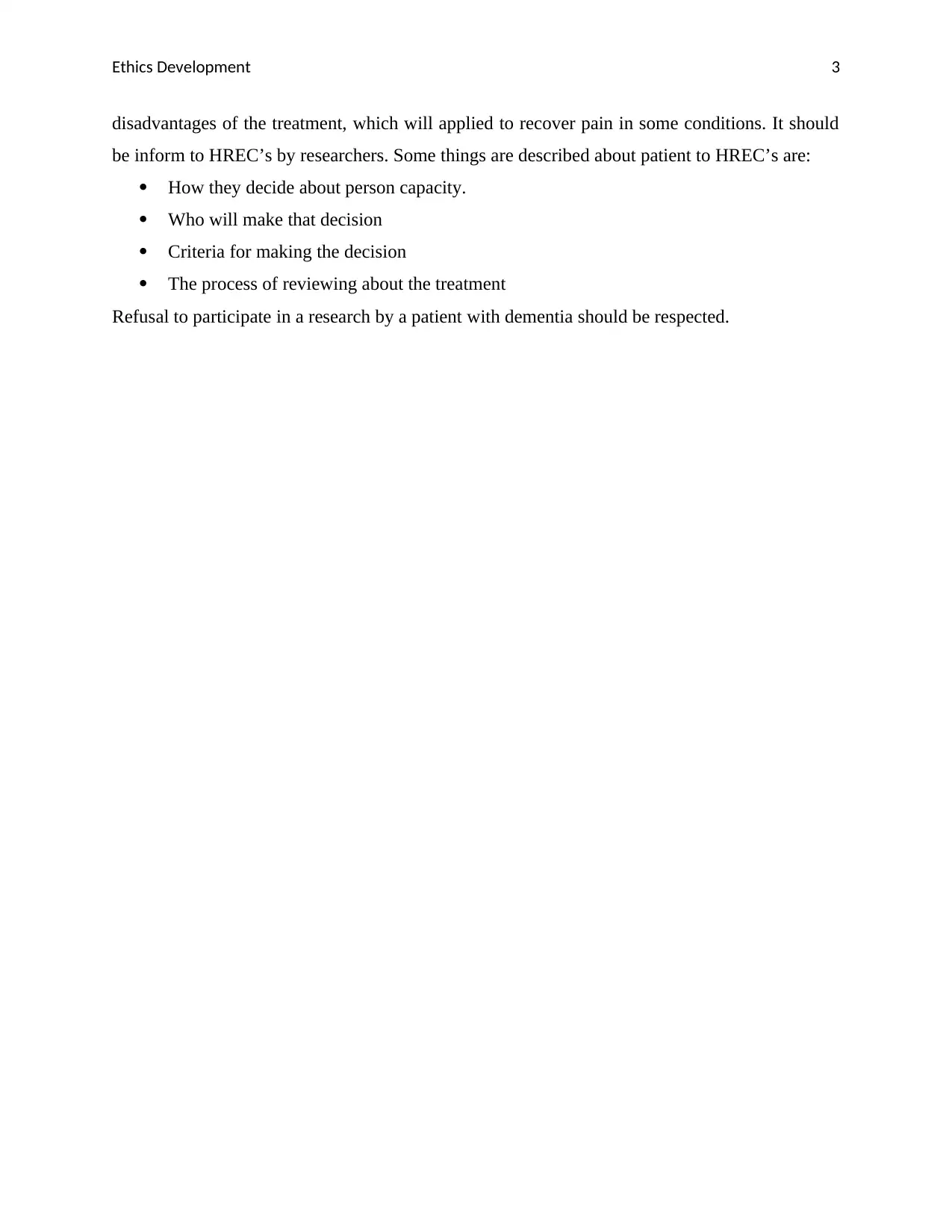
Ethics Development 3
disadvantages of the treatment, which will applied to recover pain in some conditions. It should
be inform to HREC’s by researchers. Some things are described about patient to HREC’s are:
How they decide about person capacity.
Who will make that decision
Criteria for making the decision
The process of reviewing about the treatment
Refusal to participate in a research by a patient with dementia should be respected.
disadvantages of the treatment, which will applied to recover pain in some conditions. It should
be inform to HREC’s by researchers. Some things are described about patient to HREC’s are:
How they decide about person capacity.
Who will make that decision
Criteria for making the decision
The process of reviewing about the treatment
Refusal to participate in a research by a patient with dementia should be respected.
Paraphrase This Document
Need a fresh take? Get an instant paraphrase of this document with our AI Paraphraser
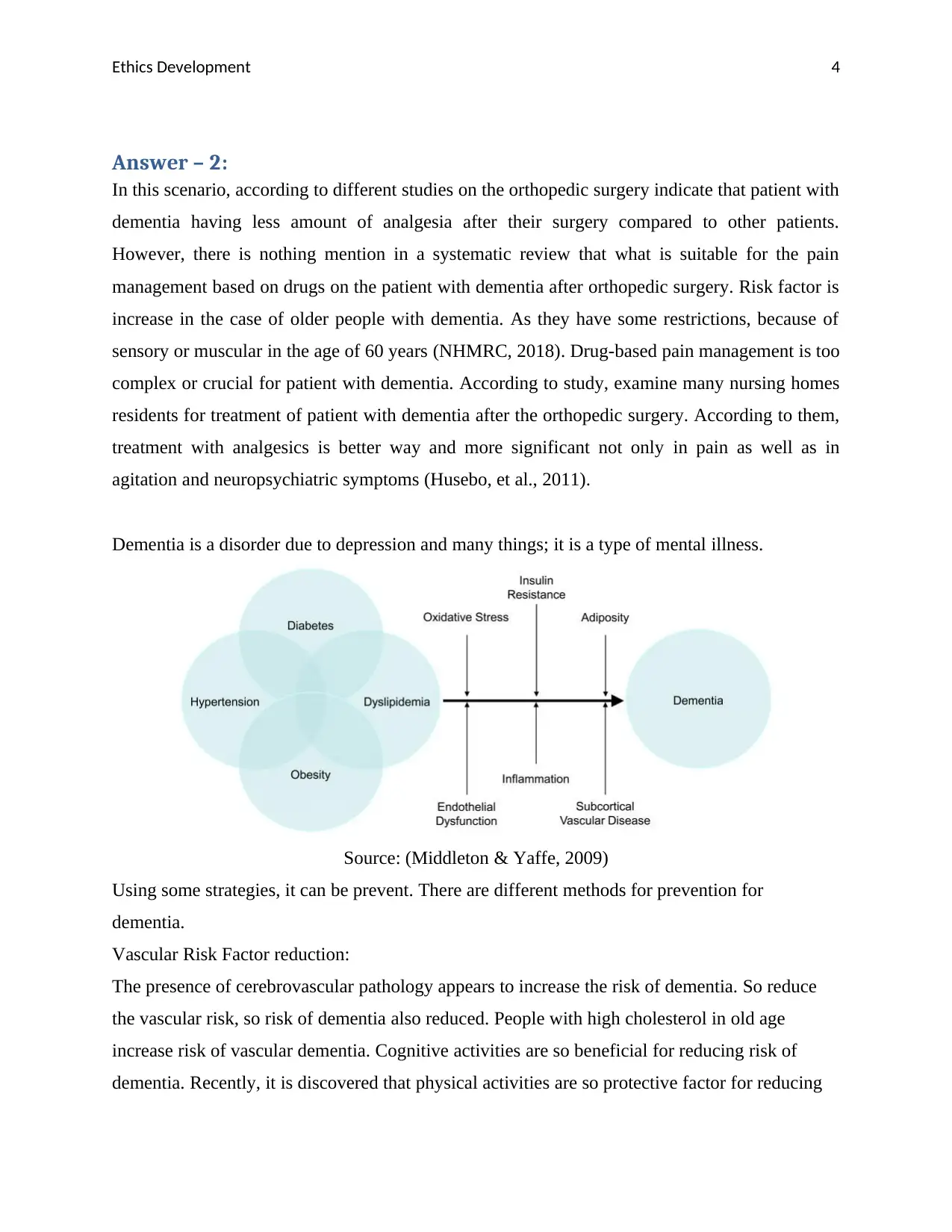
Ethics Development 4
Answer – 2:
In this scenario, according to different studies on the orthopedic surgery indicate that patient with
dementia having less amount of analgesia after their surgery compared to other patients.
However, there is nothing mention in a systematic review that what is suitable for the pain
management based on drugs on the patient with dementia after orthopedic surgery. Risk factor is
increase in the case of older people with dementia. As they have some restrictions, because of
sensory or muscular in the age of 60 years (NHMRC, 2018). Drug-based pain management is too
complex or crucial for patient with dementia. According to study, examine many nursing homes
residents for treatment of patient with dementia after the orthopedic surgery. According to them,
treatment with analgesics is better way and more significant not only in pain as well as in
agitation and neuropsychiatric symptoms (Husebo, et al., 2011).
Dementia is a disorder due to depression and many things; it is a type of mental illness.
Source: (Middleton & Yaffe, 2009)
Using some strategies, it can be prevent. There are different methods for prevention for
dementia.
Vascular Risk Factor reduction:
The presence of cerebrovascular pathology appears to increase the risk of dementia. So reduce
the vascular risk, so risk of dementia also reduced. People with high cholesterol in old age
increase risk of vascular dementia. Cognitive activities are so beneficial for reducing risk of
dementia. Recently, it is discovered that physical activities are so protective factor for reducing
Answer – 2:
In this scenario, according to different studies on the orthopedic surgery indicate that patient with
dementia having less amount of analgesia after their surgery compared to other patients.
However, there is nothing mention in a systematic review that what is suitable for the pain
management based on drugs on the patient with dementia after orthopedic surgery. Risk factor is
increase in the case of older people with dementia. As they have some restrictions, because of
sensory or muscular in the age of 60 years (NHMRC, 2018). Drug-based pain management is too
complex or crucial for patient with dementia. According to study, examine many nursing homes
residents for treatment of patient with dementia after the orthopedic surgery. According to them,
treatment with analgesics is better way and more significant not only in pain as well as in
agitation and neuropsychiatric symptoms (Husebo, et al., 2011).
Dementia is a disorder due to depression and many things; it is a type of mental illness.
Source: (Middleton & Yaffe, 2009)
Using some strategies, it can be prevent. There are different methods for prevention for
dementia.
Vascular Risk Factor reduction:
The presence of cerebrovascular pathology appears to increase the risk of dementia. So reduce
the vascular risk, so risk of dementia also reduced. People with high cholesterol in old age
increase risk of vascular dementia. Cognitive activities are so beneficial for reducing risk of
dementia. Recently, it is discovered that physical activities are so protective factor for reducing
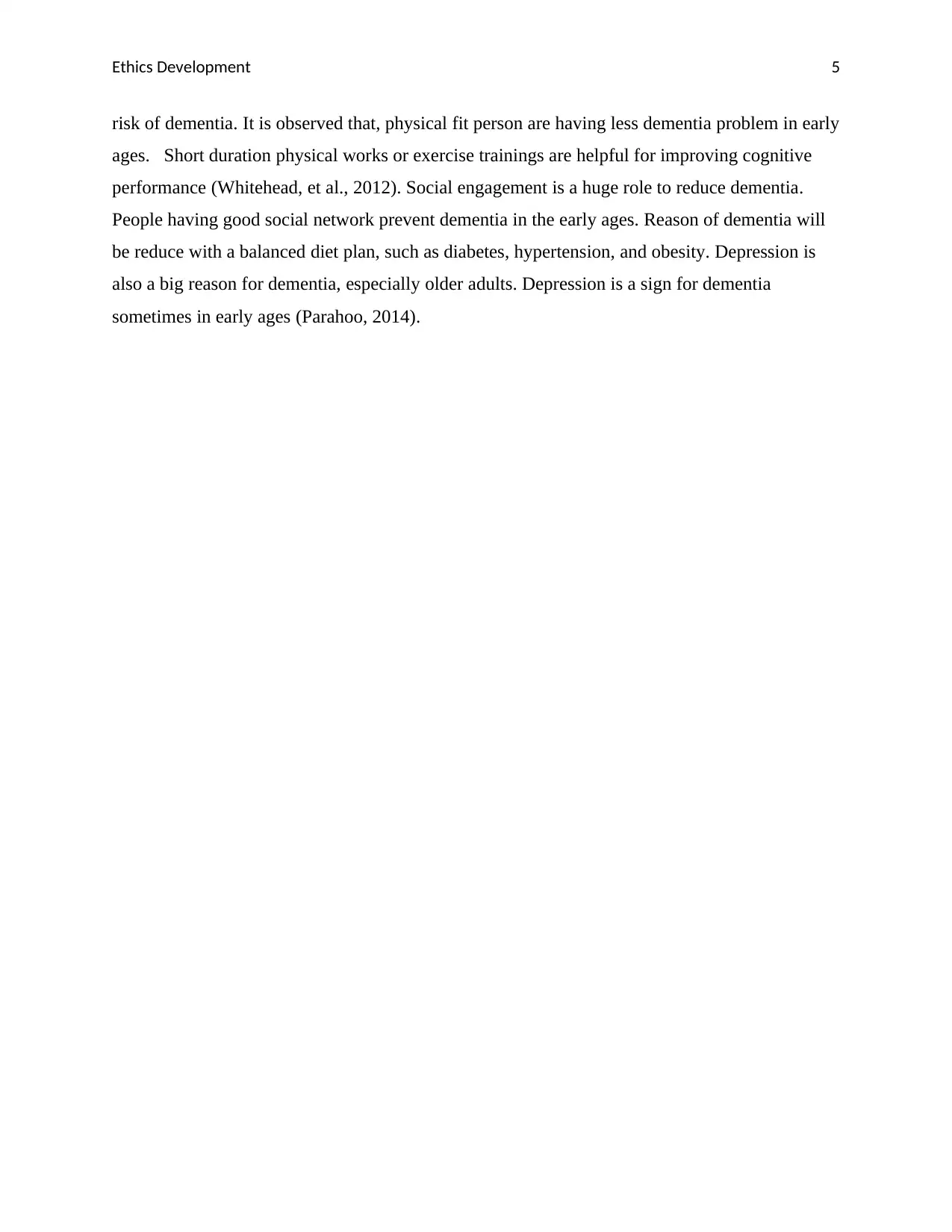
Ethics Development 5
risk of dementia. It is observed that, physical fit person are having less dementia problem in early
ages. Short duration physical works or exercise trainings are helpful for improving cognitive
performance (Whitehead, et al., 2012). Social engagement is a huge role to reduce dementia.
People having good social network prevent dementia in the early ages. Reason of dementia will
be reduce with a balanced diet plan, such as diabetes, hypertension, and obesity. Depression is
also a big reason for dementia, especially older adults. Depression is a sign for dementia
sometimes in early ages (Parahoo, 2014).
risk of dementia. It is observed that, physical fit person are having less dementia problem in early
ages. Short duration physical works or exercise trainings are helpful for improving cognitive
performance (Whitehead, et al., 2012). Social engagement is a huge role to reduce dementia.
People having good social network prevent dementia in the early ages. Reason of dementia will
be reduce with a balanced diet plan, such as diabetes, hypertension, and obesity. Depression is
also a big reason for dementia, especially older adults. Depression is a sign for dementia
sometimes in early ages (Parahoo, 2014).
⊘ This is a preview!⊘
Do you want full access?
Subscribe today to unlock all pages.

Trusted by 1+ million students worldwide
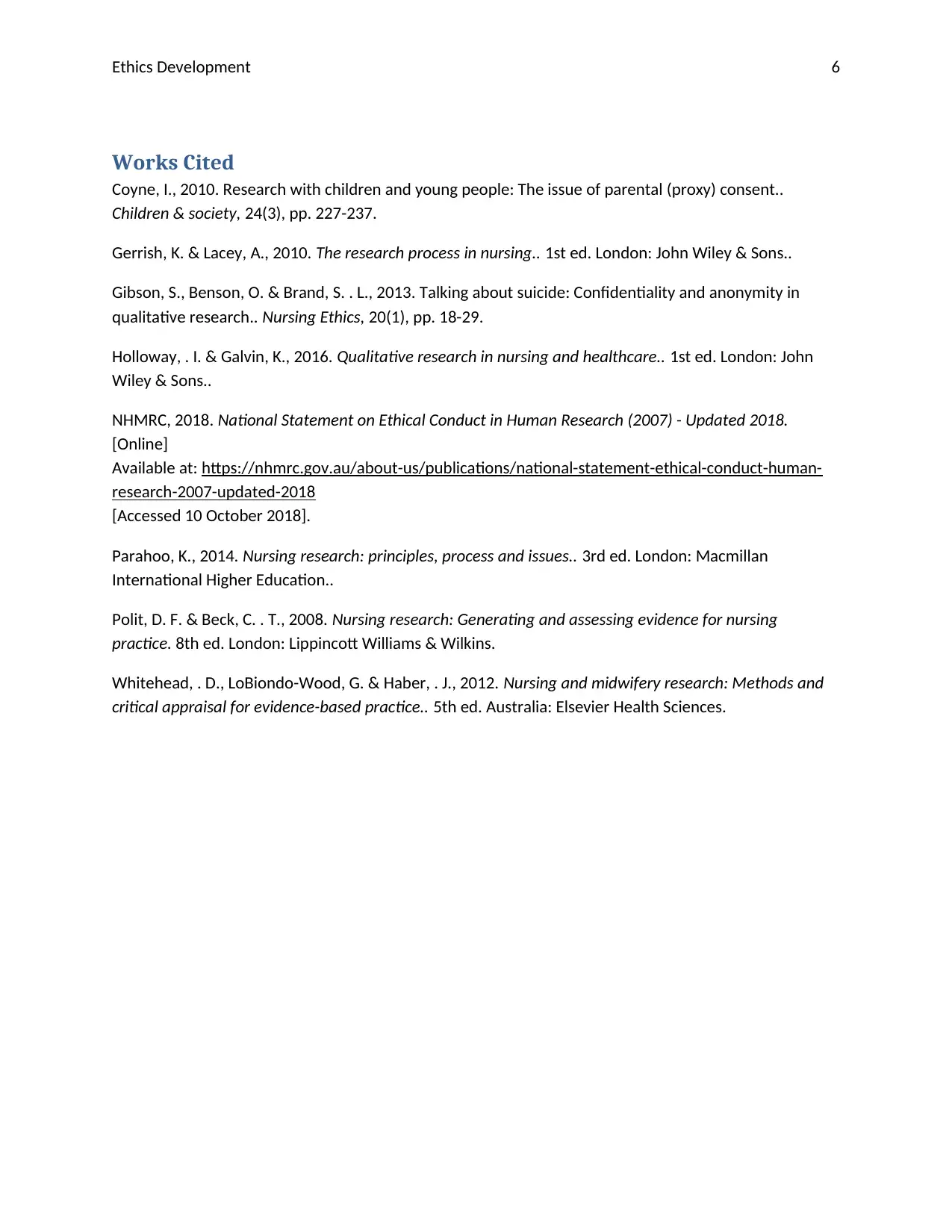
Ethics Development 6
Works Cited
Coyne, I., 2010. Research with children and young people: The issue of parental (proxy) consent..
Children & society, 24(3), pp. 227-237.
Gerrish, K. & Lacey, A., 2010. The research process in nursing.. 1st ed. London: John Wiley & Sons..
Gibson, S., Benson, O. & Brand, S. . L., 2013. Talking about suicide: Confidentiality and anonymity in
qualitative research.. Nursing Ethics, 20(1), pp. 18-29.
Holloway, . I. & Galvin, K., 2016. Qualitative research in nursing and healthcare.. 1st ed. London: John
Wiley & Sons..
NHMRC, 2018. National Statement on Ethical Conduct in Human Research (2007) - Updated 2018.
[Online]
Available at: https://nhmrc.gov.au/about-us/publications/national-statement-ethical-conduct-human-
research-2007-updated-2018
[Accessed 10 October 2018].
Parahoo, K., 2014. Nursing research: principles, process and issues.. 3rd ed. London: Macmillan
International Higher Education..
Polit, D. F. & Beck, C. . T., 2008. Nursing research: Generating and assessing evidence for nursing
practice. 8th ed. London: Lippincott Williams & Wilkins.
Whitehead, . D., LoBiondo-Wood, G. & Haber, . J., 2012. Nursing and midwifery research: Methods and
critical appraisal for evidence-based practice.. 5th ed. Australia: Elsevier Health Sciences.
Works Cited
Coyne, I., 2010. Research with children and young people: The issue of parental (proxy) consent..
Children & society, 24(3), pp. 227-237.
Gerrish, K. & Lacey, A., 2010. The research process in nursing.. 1st ed. London: John Wiley & Sons..
Gibson, S., Benson, O. & Brand, S. . L., 2013. Talking about suicide: Confidentiality and anonymity in
qualitative research.. Nursing Ethics, 20(1), pp. 18-29.
Holloway, . I. & Galvin, K., 2016. Qualitative research in nursing and healthcare.. 1st ed. London: John
Wiley & Sons..
NHMRC, 2018. National Statement on Ethical Conduct in Human Research (2007) - Updated 2018.
[Online]
Available at: https://nhmrc.gov.au/about-us/publications/national-statement-ethical-conduct-human-
research-2007-updated-2018
[Accessed 10 October 2018].
Parahoo, K., 2014. Nursing research: principles, process and issues.. 3rd ed. London: Macmillan
International Higher Education..
Polit, D. F. & Beck, C. . T., 2008. Nursing research: Generating and assessing evidence for nursing
practice. 8th ed. London: Lippincott Williams & Wilkins.
Whitehead, . D., LoBiondo-Wood, G. & Haber, . J., 2012. Nursing and midwifery research: Methods and
critical appraisal for evidence-based practice.. 5th ed. Australia: Elsevier Health Sciences.
1 out of 7
Related Documents
Your All-in-One AI-Powered Toolkit for Academic Success.
+13062052269
info@desklib.com
Available 24*7 on WhatsApp / Email
![[object Object]](/_next/static/media/star-bottom.7253800d.svg)
Unlock your academic potential
Copyright © 2020–2025 A2Z Services. All Rights Reserved. Developed and managed by ZUCOL.



